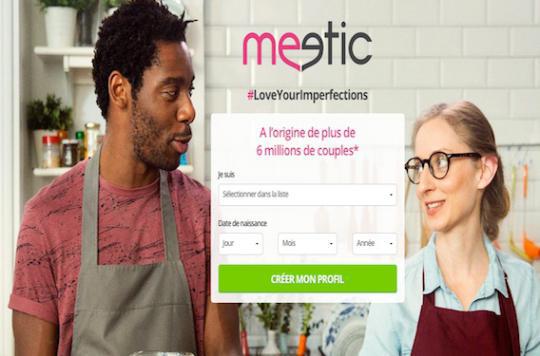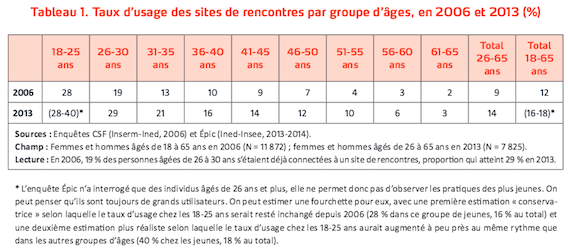Dating sites are spreading and democratizing in France. However, they do not necessarily lead to a great social mixing, or to the creation of new couples.

They are called Meetic, AttractiveWorld, or even amour.com, and they have never been so popular with the French. There is something for all ages, for all tastes and for all profiles.
Today, more than a hundred French-speaking dating sites exist, and many French people succumb to the temptation to join them, such as a new study of INED highlights this.
While these sites were born in the United States, their attendance rate by 25-65 year olds was only 9% in 2013, compared to 14% in France. Between 2006 and 2013, they gained thousands of users. In all age categories, their use has increased: for 26-30 year olds, for example, the rate of use has increased from 19 to 29% of the population, and for 46-50 year olds, from 7 to 12 %.

SOURCE INED
Does this mean that they are less taboo? Not necessarily, because 28% of registrants say that they are not in their entourage. The growth in the number of users is rather due to the fact that Internet access has improved, everywhere in the country, and that the sites have launched massive marketing campaigns to make themselves known.
“You have to realize that these sites have increased visibility, linked to their media coverage and their significant advertising presence, which explains why more people are turning to them. Internet access has also helped, and in the United States, the lower usage rate can also be explained by the extent of the Internet divide, ”underlines Marie Bergström, author of the study.
The researcher shows it clearly: the multiplication of the number of users on dating sites has been accompanied by a real phenomenon of democratization. Internet users are still mainly executives and urban, but the gap has now narrowed. Thus, 13% of workers go to these sites, against 16% of executives.
To reproduce one between oneself
However, this democratization is not accompanied by a diversity of meetings or social mixing. This may be the most significant development: dating sites have multiplied to meet a growing audience, but they have also become more specialized, more segmenting.
From unusual sites that offer encounters between Goths, between vegetarians, or even between food lovers, to those who offer to put people of the same ethnic origin or the same confession in touch, these services meet the expectations of more groups. in addition to targeted.
A self-esteem similar to “real” life, according to Marie Bergström. “This segmentation means that we are faced with a phenomenon similar to what we observe in real life. There are different meeting places according to age, socio-professional background, ”she observes.
Even if generalist sites, like Meetic, remain the most popular, the segmentation of dating platforms has in any case been accompanied by a migration of certain users to these new specialized services.
“Some respondents told me that generalist sites can be scary, because the mass effect and the large number of users are impressive. Some people therefore want to go to sites that speak to them and to users who resemble them in order to regain a certain intimacy, ”explains Marie Bergström.
Desired discretion
For the researcher, it is precisely the desire to return to something more intimate and discreet that attracts users to these sites. These allow, according to her, to get out of her circle of sociability and thus to do without the comments and pressures exerted by those around her to live a more discreet relationship, often hidden away from the eyes of those close to her.
“The fact of bypassing those around them to meet partners has an appeal, especially for young people, whose behavior is monitored by family or peers. On the Internet, the meeting is much less given to see, much more discreet, ”says Marie Bergström.
Dating sites also allow you to start a relationship without asking too many questions about the consequences that it can have, since, if it ends, no link will continue a priori to connect the two people.
It is in part because of this recklessness that the majority of romantic and sexual relationships that are formed on these sites are rarely the occasion to meet their spouse. Moreover, 57% of French people believe that sites only lead to occasional meetings.
Note, however, that their use varies greatly according to age, and that a greater number of couples are formed when it comes to divorced or separated people. 10% of the second unions of the French come from these sites, against “only” 5% of the first unions. Another group also encounters love more frequently through this bias: homosexual people, one in three of whom have met their spouse in this way.
.

















